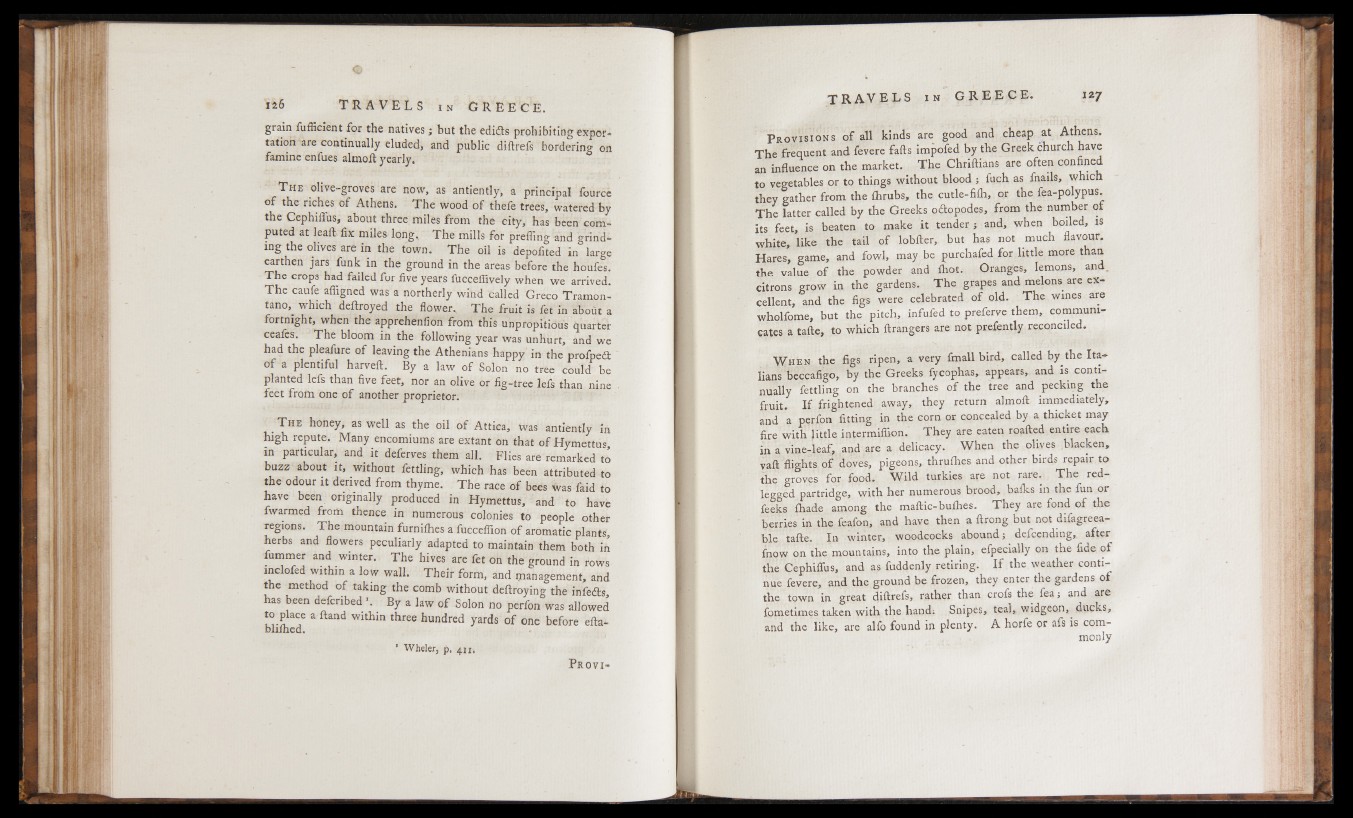
grain fufficient for the natives; but the edidts prohibiting exportation
*are continually eluded, and public diftrefe bordering on
famine enfues almoft yearly.
T he olive-groves-are now, as antiently, a principal fource
o f the riches* of Athens. The wood o f thefe trees, watered by
the Cephiflhs, about three miles from the city, has been com-
puted at leaft. fix miles- long, The mills for preffifi| and grinding
the olives are in the town. The oil is depofited in large
earthen jars funk in the ground in the areas'before the ho'ufes.
■ The crop’s had failed for five years fucceffively when we arrived.
The caufe afiigned was a northerly wind Called Greco Tramon-
2 ^ J hich^ ? r0y"d A e M M * ^he fruit is fe't in iftbut a
fortnight, when the ap p feh« nfi^fe ig’ttw'
c e a^ . The bloom in the following year was unhurt, and we
ha^ the pleafure o f leaving the Athenians happy' in the profpeQ: '
^ a plentiful harveft. By a law o f Solon no tree rabid be
planted lefs than five feet, nor an olive or fig-tree f e g ibon n»,. ,
feet from one of another proprietor; *
T he honey, as well as the oil o f Attica, Was antiently in
high repute. Many encomiums are extant on that o f Hymettus
in particular, and. it deferves them all. Flies are remarked *6
buz^ about it, without fettling, which-has been attributed to
th e odour it derived from thyme. The race o f bees ^asfaid to
have been originally produced in Hymettus, and to have
fwarmed from thence in numerous colonies to people other
regions. The;mountain fornifhes afocrafilcrn-of aromatic plants,
herbs and flowers peculiarly adapted to maintain them both th
fummerand ^winter.- The hives are fet oh thegfoundin rows
inclofed within a low wall. Their form, and ipanagertient, and
the method of taking the comb without deftroying the Mfedls
has been d e f c r i b e dBy a law df Sdlori no perfon Was allowed
to place a ftand within three hundred yards 'o f one before eftai
blilhed.
* Wheler, p, 411-,
P r o v i s i o n s of all kinds are good and cheap -at Athens.
The frequent and fevere fails impofed by the Greek church have
an influence on the market. The Chriftians are often confined
to vegetables or to things without blood ; fuch as fnails, which
they gather from the ihrubs, the cutle-fifo,, qr the fea-polypus.
The latter called by the Greeks odtopodes, from the number of
its feet* is beaten to make it tender; and, when boiled, is
white, like the tail o f lo b le r, but has not much flavour.
Hares» game, and fowl, may .be .purchafed.for little more than
the value of the powder and fliot. Oranges, lemons, and.
citrons grow in the gardens. The grapes and melons are excellent,
and the figs were celebrated o f old. The wines are
wholfome, but the pitch, infufed to preferve them, communicates
a tafte, to which ftrangers are not prefentfcr?pqnciled.
Wg|;|. the 40s? lip e n ^ very fmall bird, called ky~the Ita-
lians beccal^d, hy the Greeks fycophas, appears,, and -is- con.tr-
nuallyfettling on "the branches of the tree and pecking the
jfah „ If frightened; away» they return aimofe immediafely,
and a perfon fitting in the corn er ccpcealedbyathfoket may
fire with mtle intermifoon; They are eaten rpafted,entire each
in a vine-leaL and are a, .delicacy. When the .oliyes .blacken,
vaft 'fli^ts'ot doves^ pigeons, tftruihes- and other birth repair, to
the W tM rep. The redl^
gged.partridge, yvith her numerous byood,tha!ks in the fun or
feeks. {hade among the maftic-bufties. They are fond of the
ferries in the fegfon, and haye then a ftrqng but not difagreea-
hie tafte. In winter, woodcocks abound; defeending, after
{now on the mountains, jnto the plain, efpeeially on the fide of
the Cephiflus, and aa fuddenly retiring. If .the. weather eonti-
nqe fevere, and the.ground be frozen, they enter the gardens of
the tpwn in great cjiftrefs, rather than, crofs the fea; and are
fpmetim^s Jaken with the hand: Snipes, teal, widgeon, ducks,
and the like, are alfo found in plenty. A horfe or afs is commonly